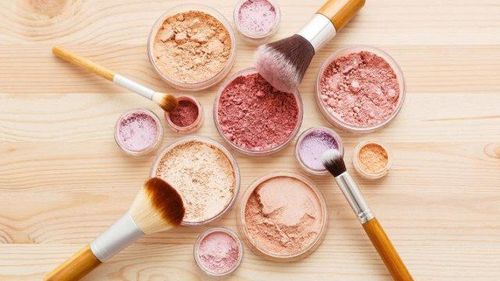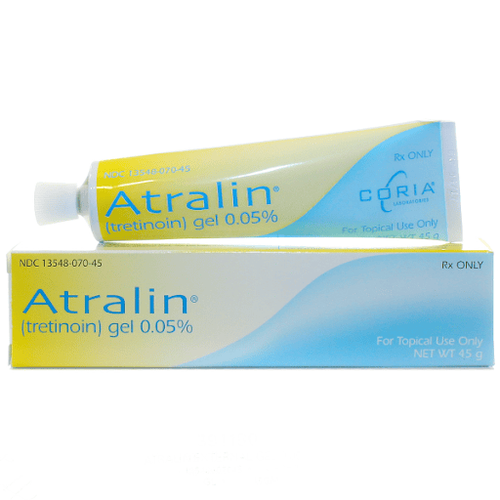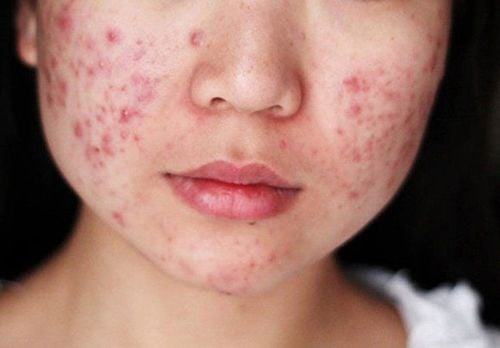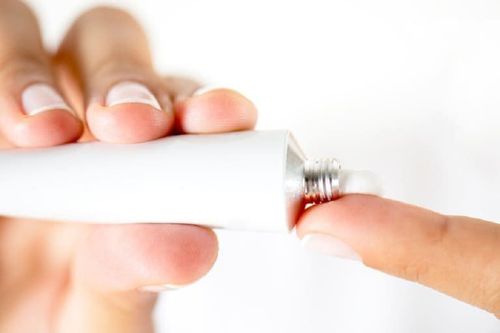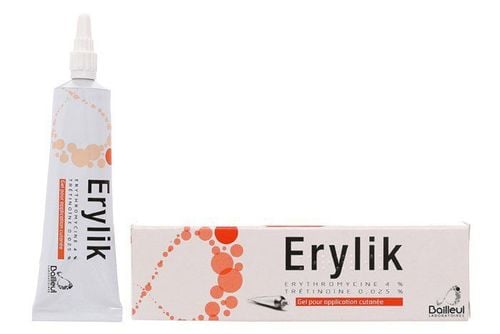This is an automatically translated article.
Acne is a problem that greatly affects psychology, health and aesthetics. Therefore, the problem of acne treatment is always interested by many people. Using antibiotics to treat acne is the method of choice for many people.
1. Causes of acne
The sebaceous glands are responsible for supplying oil to the skin. Due to various causes, the sebaceous glands are hyperkeratinized and fibrous, and the sebaceous gland mouth is blocked. From there, sebum is secreted by the skin but cannot escape, stagnates, forming tiny pimples and is called acne. Sometimes, the sebaceous glands become infected and mucus and pus accumulate underneath the blockage. Mild cases form acne with a black nucleus. In severe cases, the nodules fill with pus and turn into cysts.There are many causes of acne. Factors that cause acne come from the environment inside and outside the body, affecting the health of the skin, that is: hormone changes, bacterial invasion, genetic factors, the impact of rays UV, temperature, humidity, air quality, irritation from skin care products, unhealthy diet, science,...
MORE: Antibiotics can be used to treat acne are not?
2. Antibiotics for acne
For people with severe acne, acne antibiotics are chosen by many dermatologists as the treatment method for patients. Currently, in Vietnam, there are 2 types of antibiotics for acne: topical antibiotics (topical treatment) and oral antibiotics (systemic treatment). However, the use of oral antibiotics should be combined with topical antibiotic-free creams. If the patient has been prescribed oral antibiotics, the patient should not arbitrarily use additional topical antibiotics.2.1 Oral antibiotic Tetracycline: This is a commonly used oral antibiotic for acne. The drug is used in cases of inflammation caused by severe bacterial infections, which reduce inflammation and kill acne-causing bacteria on the skin. With the effect of controlling the number of bacteria, tetracycline controls the inflammation of the sebaceous glands, helping the skin recover quickly; Clindamycin (oral): Works by slowing down and stopping the growth of acne-causing bacteria, while effectively reducing swelling; Minocycline: Has antibacterial, anti-inflammatory effects, helps prevent the growth of bacteria, thereby effectively treating acne. However, oral antibiotics only treat within 3 months, should not be prolonged to avoid adverse effects on the body.
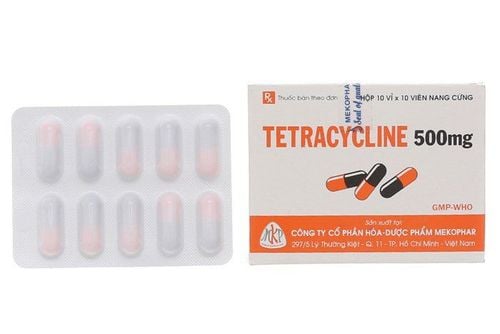
Kháng sinh đường uống Tetracycline được sử dụng phổ biến hiện nay
2.2 Topical antibiotic Clindamycin (topical form): Foam, gel, cream, solution or patch. This drug works by inhibiting the activity of acne-causing bacteria, preventing the formation of bacterial proteins. Besides, it also helps to reduce excess oil, helps maintain moisture for the skin; Dapsone: Used for severe acne cases. Patients can apply it directly to the acne-affected skin, leave it overnight; Erythromycin: Has the effect of killing acne-causing bacteria, treating acne and preventing the formation of new acne spots. Erythromycin works well in the treatment of acne in the inflamed skin around the acne. 2.3 Non-antibiotic topical benzoyl peroxide: As an antiseptic. At low concentrations, benzoyl peroxide has the ability to kill acne-causing bacteria P. acnes because it reduces free fatty acids in sebaceous gland follicles. Benzoyl peroxide works well when it comes to treating blackheads and whiteheads. However, after using benzoyl peroxide, the patient should avoid sun exposure because the drug makes the skin more susceptible to sunburn; Retinoids: Derived from vitamin A and considered the most effective anti-acne medication. Retinoids help control clogged pores, inhibit inflammation and effectively clear acne. At the same time, it promotes skin regeneration, enhances collagen production, helps heal acne marks and reduces dark spots quickly; Azelaic Acid: Reduces the production of keratin (a substance that stimulates acne growth), provides excellent anti-inflammatory and anti-inflammatory properties. Azelaic acid is used in the form of foams, gels and creams. SEE ALSO: Dry skin and many hidden acne should use acne medicine?
3. When to use antibiotics for acne?
Acne medicine helps reduce excess oil on the skin, control skin inflammation, increase sebum. Besides, it also strengthens, shortens the time of skin peeling, controls the process of increasing the stratum corneum on the skin. Acne medications also help kill and prevent bacteria from entering the pores, and at the same time fight inflammation and infection for red, swollen acne spots. In addition, the drug also helps acne quickly multiply, dry.
The use of antibiotics to treat acne is as follows:
Cases of moderate to severe acne: Patients can use oral antibiotics such as tetracycline to fight inflammation or macrolides to suppress and catch the bacteria that cause acne. Acne goes into hibernation. However, antibiotics can cause bacteria to develop resistance. Therefore, oral antibiotics should only be used for the shortest possible time. At the same time, oral antibiotics should be combined with non-antibiotic topical drugs; Cases of blackheads or whiteheads: Antibiotics may not be needed. Patients should choose an acne product, an exfoliator that contains salicylic acid, or just a proper, safe and hygienic acne remover. Cases with complicated skin conditions, many types of acne and pus: Oral antibiotics should be used, combined with topical retinoids or benzoyl peroxide. This combination helps reduce the risk of developing antibiotic resistance. Antibiotics for acne have side effects, and people with allergies may develop skin rashes when taking oral antibiotics. Besides, oral antibiotics can cause digestive upset, dizziness and stomach pain. Antibiotics for acne usually have fewer side effects, but users still need to be cautious about irritation.
In addition, antibiotics for acne also make the skin more sensitive to the sun or dry the skin. Therefore, it is recommended to test the drug by using a small amount, applying it to the inside of the wrist, and keeping it for 6-8 hours. If there are no abnormal symptoms, the user can apply it on the acne-affected area on the face.
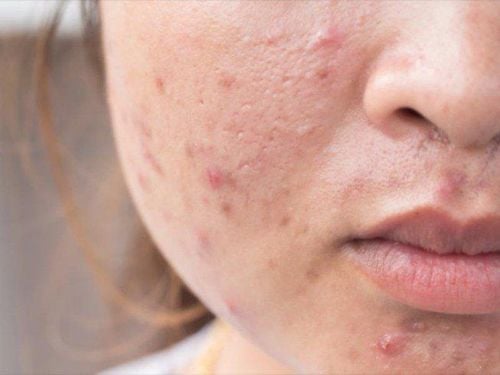
Người bị mụn trứng cá nên dùng kháng sinh dưới sự tư vấn của bác sĩ
4. Note to use antibiotics effectively to treat acne
Acne needs to be treated for a long time, at least 3-4 months. Therefore, to ensure the effectiveness when using antibiotics to treat acne, patients should pay attention to the following issues:Use a combination of prescribed drugs. If only antibiotics are used, bacteria will quickly develop resistance to them. Therefore, dermatologists often prescribe antibiotics in combination with an antibiotic-free acne medication; Gentle skin hygiene: Do not wash your face too much because it will irritate the skin, making acne worse. Therefore, it is recommended to gently clean the skin for effective antibiotic use; Follow-up appointments on time: The doctor needs to check that the patient is responding well to the course of treatment because each antibiotic will have its own effect. Therefore, the patient needs to go to the doctor on time; Skin care after acne: When the skin is clear of acne, it is necessary to use many methods to avoid recurrence of acne. Patients should follow the doctor's instructions in future skin care and gradually reduce the need for antibiotics to treat acne. When acne is severe, antibiotics are the treatment of choice. Acne treatment needs to be taken seriously and persistently to achieve long-term results, so patients need to strictly follow the instructions of the doctor. However, nowadays, the overuse of antibiotics, indiscriminate use of antibiotics has increased the risk of side effects and becoming antibiotic resistance. Therefore, patients should choose reputable medical facilities with good expertise to treat and guide the most effective use of antibiotics.
Vinmec International General Hospital is the address for examination, treatment and prevention of diseases. When performing the examination process at Vinmec, customers will be welcomed and used modern facilities and machinery along with perfect medical services under the guidance and advice of doctors. Good doctors, well-trained both at home and abroad. In case it is necessary to use antibiotics to treat respiratory diseases such as acute bronchitis, doctors at Vinmec will provide a treatment plan, and advise and guide patients to use the drug effectively. , avoid overuse, indiscriminate use of antibiotics causing unwanted side effects such as antibiotic resistance.
Please dial HOTLINE for more information or register for an appointment HERE. Download MyVinmec app to make appointments faster and to manage your bookings easily.




